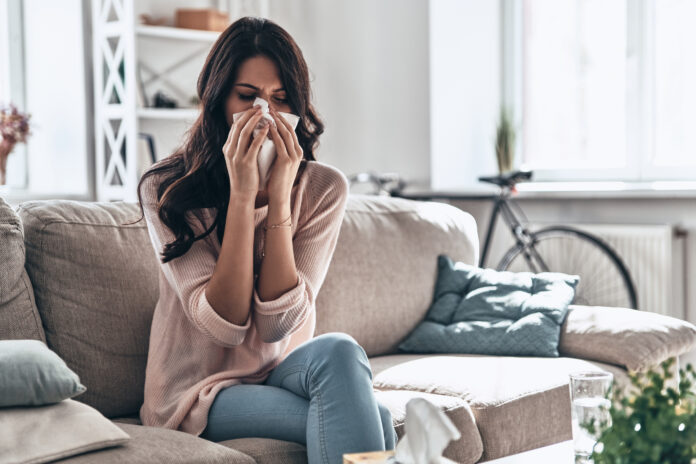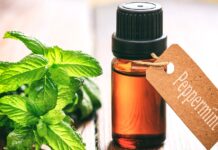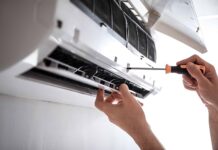
Air pollution often interferes with your activities and health. It is usually caused by dust, mold, and piles of dirt that have accumulated and not been cleaned immediately.
The house becomes a very strategic nest of dirt. Every nook and cranny is a hotbed for the dust and dirt to collect. Not to mention the items and furniture around the house that are also plastered with dust and can cause the air in the room to become less clean! But getting rid of dust and dirty air is not something that you should worry about. Air pollution in the house can be overcome with simple things like doing a regular and thorough cleaning.
A house is a place where the family gathers so it should be a safe and healthy place that can ensure the family can gather comfortably without the worry of being sick. To understand more about the dangers and risks of dirty air at home, read the full information below!
Health-Related Diseases Due to Air Pollution in the House

Constantly inhaling dirty air in your home will have a negative impact on your health. Watch out for these health issues that you may suffer if you didn’t pay attention to your home cleanliness!
1. Respiratory Disorders
Lungs are the first organ that will be affected if you live in a dirty home and inhale dust all the time. Several diseases that may arise due to air pollution at home are respiratory tract infections, asthma, chronic obstructive pulmonary disease (COPD), and lung cancer. Seeing there are relatively large respiratory health risks you can suffer, it’s a good idea to start cleaning your house from piles of dust and provide more proper and adequate ventilation.
2. Heart and Blood Vessel Disorders
You may wonder, how can dirty air affect the heart and blood vessels. However, a discovery indicates that breathing air, which is composed of harmful pollutants, can lead to atherosclerosis, a cardiovascular condition.
Atherosclerosis is the narrowing of the arteries caused by plaque buildup in the walls of the arteries. Over time, plaque buildup in the walls of blood vessels thickens the arteries which limit the flow of blood, nutrients, and oxygen throughout the body. Atherosclerosis can lead to more dangerous cardiovascular diseases, such as coronary heart disease or peripheral artery disease, as well as heart attack or stroke.
If you don’t want this to happen, keeping your home clean is an important way to take good care of your health.
3. Allergies and Influenza
For those of you who have children at home, health issues such as allergies and influenza can be very dangerous for them. Allergies can suddenly attack and affect the skin or organs of the child. Likewise with influenza, which can easily infect children through the air medium. Thus, it is very important to maintain the air quality in your home so that families, especially children, do not get sick easily. Keeping the air clean at home needs to be your priority.
What Are the Causes of Dirty Air at Home?

Keeping your home clean from air pollution is important. But to clean it effectively, you need to know what makes the air in your home unhealthy. These are some of the causes of dirty air in the house.
1. Too Much Cluttered Goods
The more items you store in your house, the more dust nests there will be. Don’t buy things if you don’t need them because they can become a place for dust and dirt to stick. Not only that, objects such as bookshelves, tables, piles of clothes, and bed sheets can also become dusty if you don’t clean them diligently. Try reducing items in your home or diligently cleaning your belongings so they don’t become nests of dust and dirt, that can affect the air in your home and make it dirty and unhealthy.
2. Limited Ventilation
A house needs good ventilation for the air to circulate better. But if your house doesn’t have adequate ventilation, it will be the main reason dirty air is trapped in the house and unable to flow outside.
3. Dirty and Rarely Cleaned Aircon
If your home is using an air conditioner, start thinking when was the last time you hired a professional technician to clean it? Are you sure that your air conditioner emits clean air?
The air conditioner can be the ultimate nest of dirt and dust in your home, without you realizing it. Due to this neglect, lots of negative health-risk can occur. Thus why it is important to make sure you always clean and wash the aircon filter regularly so that the aircon produces only clean and healthy air for your family. Read more about the importance of aircon cleaning sessions by a professional technician at http://luceaircon.sg/services/aircon-servicing.
Benefits of Reducing Air Pollution at Home

Some of the biggest benefits of reducing air pollution at home include better physical health, improved mental clarity, protection from environmental toxins, and cost savings.
Physical Health
Reducing air pollution indoors can help protect your lungs and respiratory system from dangerous particles such as dust, mold spores, pet dander, pollen, and smoke. This can help minimize the symptoms of allergies or asthma in those who suffer from them. Additionally, when indoor air is free of contaminants like secondhand smoke or chemical fumes it is easier for everyone in the household to breathe more freely and obtain more restful sleep each night.
Mental Clarity
When indoor air quality is poor it can cause headaches and fatigue which can impair concentration and productivity throughout the day. Taking steps to reduce pollutants such as dust mites or pet dander that often occur naturally in a dwelling also helps keep energy levels up so that time spent inside your home is much healthier for your mind as well as your body.
Environmental Protection
By reducing airborne pollutants indoors you will also be protecting other living creatures in addition to yourself. High levels of pollutants left unchecked can be harmful to domestic animals living inside the home or wildlife living outdoors near it; protecting them from exposure allows us all to remain healthy without additional stress on our environment due to unnatural chemicals or toxins present in unregulated levels within our environment.











